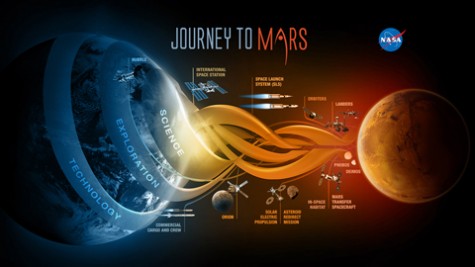Mission to Mars

Could you imagine picking up your family, getting in a spaceship, and colonizing a different…planet? It almost seems like the plot line of a borderline cheesy sci-fi movie, but this could be a very real possibility in the near future. Robots have been exploring and studying Mars for over 40 years, but now that they have found water the National Aeronautics and Space Administration (NASA) is prepping to send human life to the Red Planet, according to NASA.
Since the discovery of water on Mars, there has been a lot of controversy regarding whether there is already life on Mars, and whether it will actually be able to sustain life. North Platte High School sophomore Brandon Grachek said, “I feel like there might be microorganisms in the water.”
NASA headquarters of communications, David Steitz, confirmed this, saying there is signatures of hydrated minerals on slopes where mysterious streaks have been seen. Is there already life on Mars, though? Steitz said, ”We want to find out, it gets back to mankind’s fundamental search for answers to questions about our universe and how and where life exists.”
So what does this mean in terms of how sustainable human life would be on the Red Planet if we had to relocate? Just taking a glance at the atmosphere itself, in comparison to Earth’s, the oxygen content on Mars is 0.13 percent compared with the 21 percent in Earth’s atmosphere.
Carbon dioxide makes up 95.3 percent of the gas in the atmosphere of Mars, it also contains Nitrogen and Argon, and there is very small amounts of water and methane as well, according to NASA.
NPHS science teacher Todd Ascherl thinks inhabiting Mars isn’t a very good idea. ”The conditions there are…viciously more hostile than here on Earth. For example, the temperature is brutally hot during the day and extremely cold during the night, and the air pressure is much less…and that leads to more powerful and deadly sun rays,” said Ascherl.
Steitz on the other hand, believes that during the coming decades, the Mars’ outpost may lead to colonization for future generations of humans.
Before we get ahead of ourselves though, we need to continue the basic exploration of the Red Planet that’s underway, said Steitz.
Steitz said “This is why we explore and this is why we need the innovative thinking of the Mars generation.” Steitz said, it’s this generation that will live and work on Mars, they will be the real Martians
Additional Reporting done by Staff Writer Nate Merz.



Megan • Jan 8, 2016 at 12:31 PM
It would be cool to be able to go to mars in the near future. However there are many things that would have to adjusted for us to live there. Although in the future i’m sure these changes would be doable.